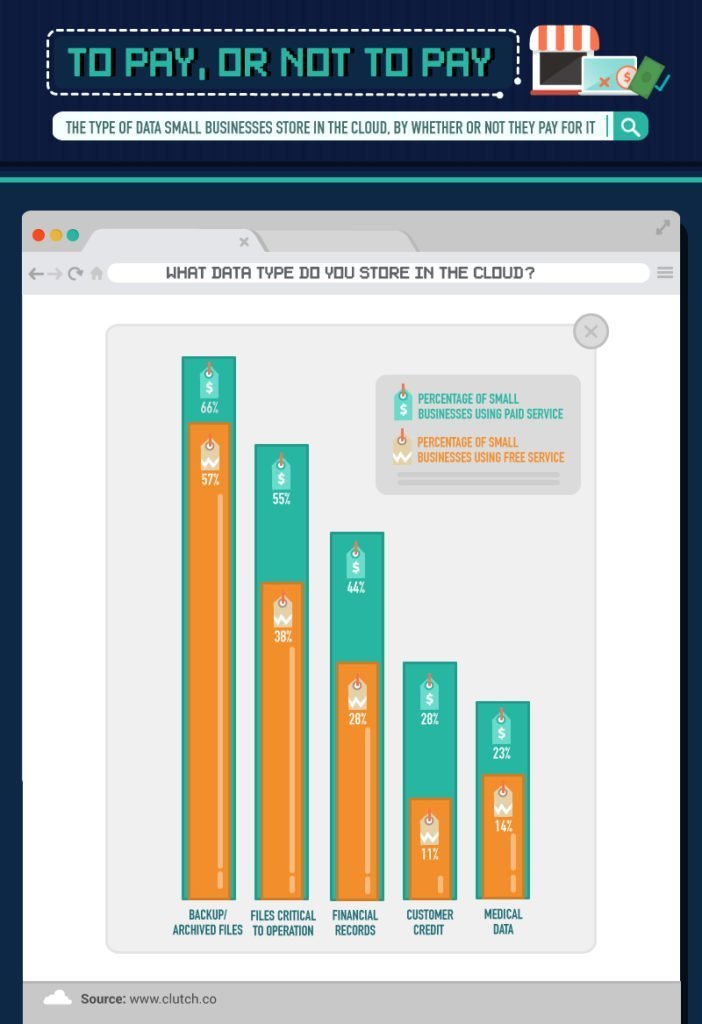What do you think of when you hear the term “cloud data”? When I first started using computers in my daily work, back in the stone age when we had to know DOS, we never thought of “the cloud” or using it as a place to store important business data. If I had suggested it to my boss he probably would have looked at me like I’d lost my mind and exclaimed, “Let my confidential information float around on the internet?!! Have you lost your mind?!!”
That was in the late 80’s and while the concept of cloud storage was introduced as early as the 60’s it didn’t really gain popularity for businesses until the late 90’s. We’ve come a long way even since then.
Flash forward to 2020 and global cloud computing is expected to be a 270 billion dollar industry, and 90 percent of companies in the U.S. say they either plan to maintain or increase their cloud computing budgets.
Where IS the Cloud?
I STILL get this question frequently. But I can’t really say I blame the people who ask. As a very literal person, I could never quite wrap my mind around it so I did some research.
Your data is not floating around in one of those fluffy balls of cotton we see every day. It is actually stored in physical storage facilities that span multiple servers and, very frequently, locations. The physical storage facilities are typically owned and managed by a hosting company. These providers are responsible for keeping your data available and accessible as well as protected.
Curious where your data lives? Use this interactive map to find out:
Recommended for You
Webcast, November 2nd: How to Get Your Lost Rankings Back in Google (Quickly!)
Why an entrepreneur or small business should use cloud storage
Like many small business owners, you may be wondering what are the advantages of using the cloud. How will it help your business run better, smoother and more efficiently? Let’s look at a few of the benefits.
- Mobility No doubt about it, we are living in a highly mobile world. We are able to work and play whenever and wherever we find ourselves. You may work while waiting for a flight at the airport or at your child’s sports practice. With the availability of cloud storage, you can do this efficiently without having to upload and download files between devices. The newest version of your document will be easily accessible whether you are working from your phone, tablet or office computer.
- Virtual Teams If you work with a virtual assistant, bookkeeper, sales team or simply have employees who work from home, cloud storage is a must for convenience and efficiency. Your employees and subcontractors can work from anywhere there is an internet connection and have easy access to the files and documents they need. No more emailing a document back and forth!
- Reduce IT Costs Storing your data in the cloud will reduce or eliminate your need for an in-house IT person or expensive consultants. Buying and maintaining your own server is expensive. If you use a service like Google Drive or Dropbox, you won’t need to spend money on server support personnel. You could easily save your business $5,000 to $10,000 or more a year.
- Data Backup If your computer crashed today, or there was a natural disaster that destroyed your equipment, would your data be lost? It’s a frightening thought for most of us. If you backup all your data to the cloud, you don’t have to worry about it. This can even be done automatically without a thought on your part.
The Cost of Cloud Storage
If you are on a tight budget, the good news is not every cloud storage product on the market comes with a price tag. A study by Summit Hosting found that 57% of respondents said they were using free services. Personally, I have found most of the entrepreneurs I work with use Google Drive or Dropbox.
However, a large number preferred a paid backup solution. These businesses cited everything from financial records to medical data and amenities like increased functionality and customer support that made paying for cloud service solutions worth the money for their business.
This graph shows what type of data small businesses store in the cloud and whether or not they are willing to pay for it.
Are You Ready for Cloud Storage?
The cloud has already changed the way we work. Whether you use it for simple tasks like backup and data synchronization or a more complex CRM solution or servers and application hosting, 60 to 70% of all computer functions are hosted by cloud-based solutions. Over the next few years, that number will rise. Are you ready?

